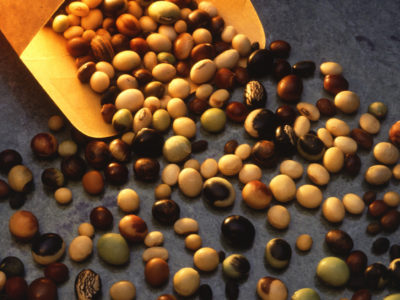Soy is another ingredient that has permeated the food supply. Soy lecithin and soy protein are especially common ingredients to find in packaged goods. The following list includes foods that are derived from soy:
- bean curd
- bean sprouts
- chocolate (soy lecithin may be used in manufacturing)
- edamame (fresh soybeands)
- hydrolyzed soy protein (HSP)
- kinako
- miso (fermented soybean paste)
- mono- and diglycerides
- MSG (monosodium glutamate)
- natto
- nimame
- okara
- shoyu
- soy albumin
- soy cheese
- soy fiber
- soy flour
- soy grits
- soy ice cream
- soy lecithin
- soy meal
- soy milk
- soy nuts
- soy pasta
- soy protein (concentrate, hydrolyzed, isolate)
- soy sauce
- soy sprouts
- soy yogurt
- soya
- soybean (curds, granules)
- soybean oil
- tamari
- tempeh
- teriyaki sauce
- textured vegetable protein (TVP)
- tofu (dofu, kori-dofu)
- yuba
Products that commonly contain soy:
- waxes or horticultural oils on fruits
- Asian cuisine (Chinese, Japanese, Korean, Thai)
- baked goods
- baking mixes
- bouillon cubes
- candy
- cereal
- chicken (raw or cooked) processed with chicken broth
- chicken broth
- deli meats
- energy bars/nutrition bars
- imitation dairy foods, such as soy milks, vegan cheese, and vegan ice cream
- infant formula
- margarine
- mayonnaise
- meat products with fillers (for example, burgers or sausages)
- nutrition supplements (vitamins)
- peanut butter and peanut butter substitutes
- protein powders
- sauces and gravies
- smoothies
- soups
- vegetable broth
- vegetarian meat substitutes (veggie burgers, imitation chicken patties, imitation lunch meats, imitation bacon bits)
Potentially cross-contaminated foods must be labeled
- “may contain soy
- “produced on shared equipment with soy”
- produced in a facility that also processes soy”


 How to Avoid Corn
How to Avoid Corn